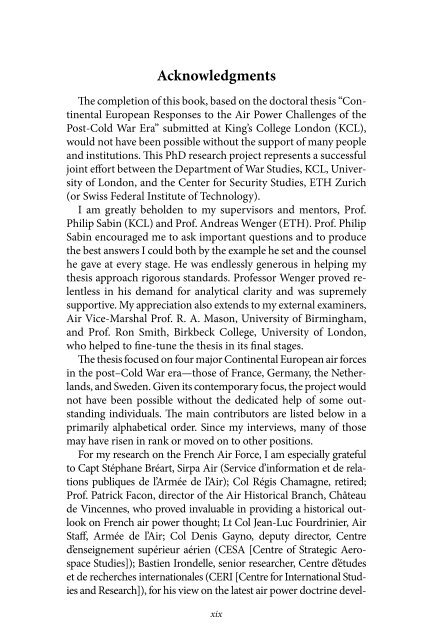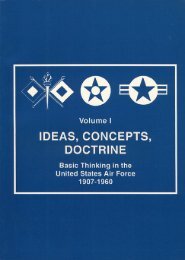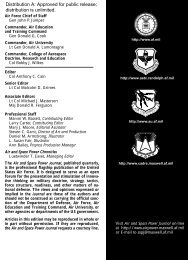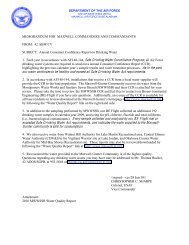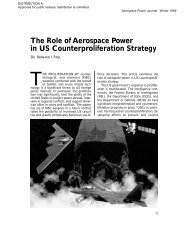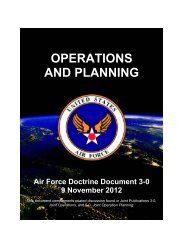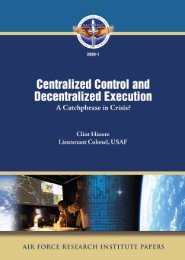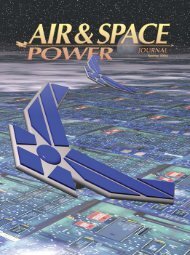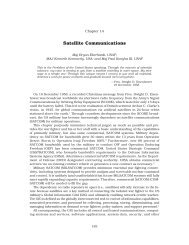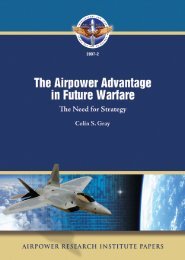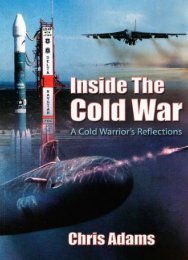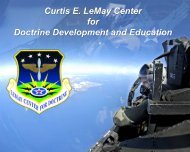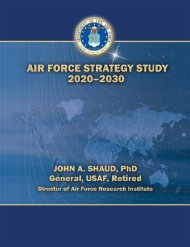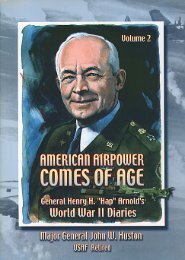- Page 3 and 4: The Quest for Relevant Air Power
- Page 5 and 6: The Quest for Relevant Air Power Co
- Page 7: Dedicated to my parents, Olga and C
- Page 10 and 11: CONTENTS Chapter Page How Have Fren
- Page 12 and 13: CONTENTS Table Illustrations Page 1
- Page 14 and 15: CONTENTS Photo Page Eurofighter Typ
- Page 17 and 18: Foreword During the Cold War, the c
- Page 19: About the Author Christian F. Anrig
- Page 23 and 24: ACKNOWLEDGMENTS director, European
- Page 25 and 26: Chapter 1 Introduction Continental
- Page 27 and 28: INTRODUCTION │ 3 lar country and
- Page 29 and 30: INTRODUCTION │ 5 Moreover, no cle
- Page 31 and 32: INTRODUCTION │ 7 assets. Since it
- Page 33 and 34: INTRODUCTION │ 9 cally confined t
- Page 35: INTRODUCTION │ 11 real operations
- Page 38 and 39: 14 │ POST-COLD WAR CHALLENGES sta
- Page 40 and 41: 16 │ POST-COLD WAR CHALLENGES Cou
- Page 42 and 43: 18 │ POST-COLD WAR CHALLENGES EU
- Page 44 and 45: 20 │ POST-COLD WAR CHALLENGES Def
- Page 46 and 47: 22 │ POST-COLD WAR CHALLENGES All
- Page 48 and 49: 24 │ POST-COLD WAR CHALLENGES air
- Page 50 and 51: 26 │ POST-COLD WAR CHALLENGES clu
- Page 52 and 53: 28 │ POST-COLD WAR CHALLENGES air
- Page 54 and 55: 30 │ POST-COLD WAR CHALLENGES Ana
- Page 56 and 57: 32 │ POST-COLD WAR CHALLENGES mon
- Page 58 and 59: 34 │ POST-COLD WAR CHALLENGES lau
- Page 60 and 61: 36 │ POST-COLD WAR CHALLENGES NAT
- Page 62 and 63: 38 │ POST-COLD WAR CHALLENGES The
- Page 64 and 65: 40 │ POST-COLD WAR CHALLENGES the
- Page 66 and 67: 42 │ POST-COLD WAR CHALLENGES con
- Page 68 and 69: 44 │ POST-COLD WAR CHALLENGES att
- Page 70 and 71:
46 │ POST-COLD WAR CHALLENGES in
- Page 72 and 73:
48 │ POST-COLD WAR CHALLENGES doc
- Page 74 and 75:
50 │ POST-COLD WAR CHALLENGES the
- Page 76 and 77:
52 │ POST-COLD WAR CHALLENGES Bes
- Page 78 and 79:
54 │ POST-COLD WAR CHALLENGES pro
- Page 80 and 81:
56 │ POST-COLD WAR CHALLENGES bas
- Page 82 and 83:
58 │ POST-COLD WAR CHALLENGES Now
- Page 84 and 85:
60 │ POST-COLD WAR CHALLENGES Cou
- Page 86 and 87:
62 │ POST-COLD WAR CHALLENGES tec
- Page 88 and 89:
64 │ POST-COLD WAR CHALLENGES men
- Page 90 and 91:
66 │ POST-COLD WAR CHALLENGES Str
- Page 92 and 93:
68 │ POST-COLD WAR CHALLENGES 63.
- Page 94 and 95:
70 │ POST-COLD WAR CHALLENGES 110
- Page 96 and 97:
72 │ POST-COLD WAR CHALLENGES 157
- Page 98 and 99:
74 │ POST-COLD WAR CHALLENGES 209
- Page 100 and 101:
76 │ POST-COLD WAR CHALLENGES 253
- Page 102 and 103:
78 │ POST-COLD WAR CHALLENGES 294
- Page 105 and 106:
Chapter 3 French Air Force (Armée
- Page 107 and 108:
French Air Force │ 83 the course
- Page 109 and 110:
French Air Force │ 85 necessary.
- Page 111 and 112:
French Air Force │ 87 Even with t
- Page 113 and 114:
French Air Force │ 89 The reorgan
- Page 115 and 116:
French Air Force │ 91 To further
- Page 117 and 118:
French Air Force │ 93 allowed Fra
- Page 119 and 120:
French Air Force │ 95 in Naples.
- Page 121 and 122:
French Air Force │ 97 Courtesy FA
- Page 123 and 124:
French Air Force │ 99 had formali
- Page 125 and 126:
French Air Force │ 101 FAF C-160
- Page 127 and 128:
French Air Force │ 103 laser-guid
- Page 129 and 130:
French Air Force │ 105 Watch supe
- Page 131 and 132:
French Air Force │ 107 Charles de
- Page 133 and 134:
French Air Force │ 109 quoise, wh
- Page 135 and 136:
French Air Force │ 111 In 1992 th
- Page 137 and 138:
French Air Force │ 113 The first
- Page 139 and 140:
French Air Force │ 115 an outlook
- Page 141 and 142:
French Air Force │ 117 course par
- Page 143 and 144:
French Air Force │ 119 française
- Page 145 and 146:
French Air Force │ 121 ondary. 24
- Page 147 and 148:
French Air Force │ 123 focus of d
- Page 149 and 150:
French Air Force │ 125 Courtesy F
- Page 151 and 152:
French Air Force │ 127 purchased
- Page 153 and 154:
French Air Force │ 129 Courtesy F
- Page 155 and 156:
French Air Force │ 131 was origin
- Page 157 and 158:
French Air Force │ 133 managing r
- Page 159 and 160:
French Air Force │ 135 out the 19
- Page 161 and 162:
French Air Force │ 137 29. Ibid.,
- Page 163 and 164:
French Air Force │ 139 81. Sarkoz
- Page 165 and 166:
French Air Force │ 141 136. Soubi
- Page 167 and 168:
French Air Force │ 143 173. These
- Page 169 and 170:
French Air Force │ 145 213. See S
- Page 171 and 172:
French Air Force │ 147 258. LPM 1
- Page 173:
French Air Force │ 149 315. Séna
- Page 176 and 177:
152 │ GERMAN Air Force disposal f
- Page 178 and 179:
154 │ GERMAN Air Force dependence
- Page 180 and 181:
156 │ GERMAN Air Force With the D
- Page 182 and 183:
158 │ GERMAN Air Force evacuation
- Page 184 and 185:
160 │ GERMAN Air Force Air Force
- Page 186 and 187:
162 │ GERMAN Air Force Chief of t
- Page 188 and 189:
164 │ GERMAN Air Force Air Force
- Page 190 and 191:
166 │ GERMAN Air Force Amongst th
- Page 192 and 193:
168 │ GERMAN Air Force nado comba
- Page 194 and 195:
170 │ GERMAN Air Force for a Euro
- Page 196 and 197:
172 │ GERMAN Air Force fensive co
- Page 198 and 199:
174 │ GERMAN Air Force general, b
- Page 200 and 201:
176 │ GERMAN Air Force natural di
- Page 202 and 203:
178 │ GERMAN Air Force Flight, it
- Page 204 and 205:
180 │ GERMAN Air Force At the end
- Page 206 and 207:
182 │ GERMAN Air Force border are
- Page 208 and 209:
184 │ GERMAN Air Force June 2004,
- Page 210 and 211:
186 │ GERMAN Air Force findings a
- Page 212 and 213:
188 │ GERMAN Air Force Teaching o
- Page 214 and 215:
190 │ GERMAN Air Force backdrop,
- Page 216 and 217:
192 │ GERMAN Air Force with the f
- Page 218 and 219:
194 │ GERMAN Air Force trial coop
- Page 220 and 221:
196 │ GERMAN Air Force With the e
- Page 222 and 223:
198 │ GERMAN Air Force Courtesy E
- Page 224 and 225:
200 │ GERMAN Air Force Courtesy A
- Page 226 and 227:
202 │ GERMAN Air Force Ground Bas
- Page 228 and 229:
204 │ GERMAN Air Force classical
- Page 230 and 231:
206 │ GERMAN Air Force warfare, o
- Page 232 and 233:
208 │ GERMAN Air Force 25. See al
- Page 234 and 235:
210 │ GERMAN Air Force 80. MOD, G
- Page 236 and 237:
212 │ GERMAN Air Force 139. MOD,
- Page 238 and 239:
214 │ GERMAN Air Force 199. Jaros
- Page 240 and 241:
216 │ GERMAN Air Force akademie d
- Page 242 and 243:
218 │ GERMAN Air Force 273. MOD,
- Page 244 and 245:
220 │ GERMAN Air Force 332. LPM 2
- Page 246 and 247:
222 │ ROYAL NETHERLANDS Air Force
- Page 248 and 249:
224 │ ROYAL NETHERLANDS Air Force
- Page 250 and 251:
226 │ ROYAL NETHERLANDS Air Force
- Page 252 and 253:
228 │ ROYAL NETHERLANDS Air Force
- Page 254 and 255:
230 │ ROYAL NETHERLANDS Air Force
- Page 256 and 257:
232 │ ROYAL NETHERLANDS Air Force
- Page 258 and 259:
234 │ ROYAL NETHERLANDS Air Force
- Page 260 and 261:
236 │ ROYAL NETHERLANDS Air Force
- Page 262 and 263:
238 │ ROYAL NETHERLANDS Air Force
- Page 264 and 265:
240 │ ROYAL NETHERLANDS Air Force
- Page 266 and 267:
242 │ ROYAL NETHERLANDS Air Force
- Page 268 and 269:
244 │ ROYAL NETHERLANDS Air Force
- Page 270 and 271:
246 │ ROYAL NETHERLANDS Air Force
- Page 272 and 273:
248 │ ROYAL NETHERLANDS Air Force
- Page 274 and 275:
250 │ ROYAL NETHERLANDS Air Force
- Page 276 and 277:
252 │ ROYAL NETHERLANDS Air Force
- Page 278 and 279:
254 │ ROYAL NETHERLANDS Air Force
- Page 280 and 281:
256 │ ROYAL NETHERLANDS Air Force
- Page 282 and 283:
258 │ ROYAL NETHERLANDS Air Force
- Page 284 and 285:
260 │ ROYAL NETHERLANDS Air Force
- Page 286 and 287:
262 │ ROYAL NETHERLANDS Air Force
- Page 288 and 289:
264 │ ROYAL NETHERLANDS Air Force
- Page 290 and 291:
266 │ ROYAL NETHERLANDS Air Force
- Page 292 and 293:
268 │ ROYAL NETHERLANDS Air Force
- Page 294 and 295:
270 │ ROYAL NETHERLANDS Air Force
- Page 296 and 297:
272 │ ROYAL NETHERLANDS Air Force
- Page 298 and 299:
274 │ ROYAL NETHERLANDS Air Force
- Page 300 and 301:
276 │ ROYAL NETHERLANDS Air Force
- Page 303 and 304:
Chapter 6 Swedish Air Force (Flygva
- Page 305 and 306:
swedish Air Force │ 281 fence est
- Page 307 and 308:
swedish Air Force │ 283 In the wa
- Page 309 and 310:
swedish Air Force │ 285 Courtesy
- Page 311 and 312:
swedish Air Force │ 287 serve in
- Page 313 and 314:
swedish Air Force │ 289 Courtesy
- Page 315 and 316:
swedish Air Force │ 291 number of
- Page 317 and 318:
swedish Air Force │ 293 Nordic pe
- Page 319 and 320:
swedish Air Force │ 295 in the ev
- Page 321 and 322:
swedish Air Force │ 297 FAF C-135
- Page 323 and 324:
swedish Air Force │ 299 Courtesy
- Page 325 and 326:
swedish Air Force │ 301 Yet, Swed
- Page 327 and 328:
swedish Air Force │ 303 forces co
- Page 329 and 330:
swedish Air Force │ 305 Hercules
- Page 331 and 332:
swedish Air Force │ 307 rethink t
- Page 333 and 334:
swedish Air Force │ 309 harmonise
- Page 335 and 336:
swedish Air Force │ 311 of the re
- Page 337 and 338:
swedish Air Force │ 313 achieving
- Page 339 and 340:
swedish Air Force │ 315 Throughou
- Page 341 and 342:
swedish Air Force │ 317 was appro
- Page 343 and 344:
swedish Air Force │ 319 ously upg
- Page 345 and 346:
swedish Air Force │ 321 from grou
- Page 347 and 348:
swedish Air Force │ 323 gathering
- Page 349 and 350:
swedish Air Force │ 325 rapid rea
- Page 351 and 352:
swedish Air Force │ 327 Notes 1.
- Page 353 and 354:
swedish Air Force │ 329 44. Gen H
- Page 355 and 356:
swedish Air Force │ 331 85. Aliso
- Page 357 and 358:
swedish Air Force │ 333 144. Ibid
- Page 359 and 360:
swedish Air Force │ 335 195. Sven
- Page 361 and 362:
Chapter 7 Conclusion As the prelimi
- Page 363 and 364:
CONCLUSION │ 339 Table 6. Tabular
- Page 365 and 366:
CONCLUSION │ 341 a IISS, The Mili
- Page 367 and 368:
CONCLUSION │ 343 limited defence
- Page 369 and 370:
CONCLUSION │ 345 European countri
- Page 371 and 372:
CONCLUSION │ 347 had the biggest
- Page 373 and 374:
CONCLUSION │ 349 of these venture
- Page 375 and 376:
CONCLUSION │ 351 debate, particul
- Page 377 and 378:
CONCLUSION │ 353 trine, the chief
- Page 379 and 380:
CONCLUSION │ 355 allowing France
- Page 381 and 382:
CONCLUSION │ 357 “air power inc
- Page 383 and 384:
CONCLUSION │ 359 France’s leadi
- Page 385 and 386:
CONCLUSION │ 361 each of the air
- Page 387 and 388:
Abbreviations AAM AAP AAR AASM ACCS
- Page 389 and 390:
ABBREVIATIONS │ 365 FBW FLA FLIR
- Page 391:
ABBREVIATIONS │ 367 SACT Supreme
- Page 394 and 395:
370 │ BIBLIOGRAPHY Havenith, Lt C
- Page 396 and 397:
372 │ BIBLIOGRAPHY Official Docum
- Page 398 and 399:
374 │ BIBLIOGRAPHY ———. Hea
- Page 400 and 401:
376 │ BIBLIOGRAPHY Parliamentary
- Page 402 and 403:
378 │ BIBLIOGRAPHY Bundesminister
- Page 404 and 405:
380 │ BIBLIOGRAPHY European Way o
- Page 406 and 407:
382 │ BIBLIOGRAPHY Hoyle, Craig.
- Page 408 and 409:
384 │ BIBLIOGRAPHY “Luftwaffens
- Page 410 and 411:
386 │ BIBLIOGRAPHY Schmidt, Wolfg
- Page 412 and 413:
388 │ BIBLIOGRAPHY Zaude, Lt Col
- Page 414 and 415:
390 │ INDEX E-3/E-3A/E-3F Airborn
- Page 416 and 417:
392 │ INDEX Boyd, John, 254, 308,
- Page 418 and 419:
394 │ INDEX EAG. See European Air
- Page 420 and 421:
396 │ INDEX International Securit
- Page 422 and 423:
398 │ INDEX nuclear deterrence, 1
- Page 424 and 425:
400 │ INDEX Swedish Air Force JAS


